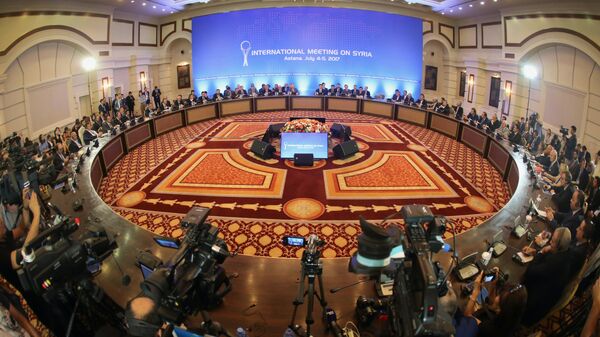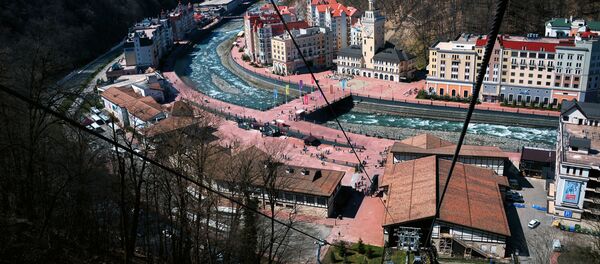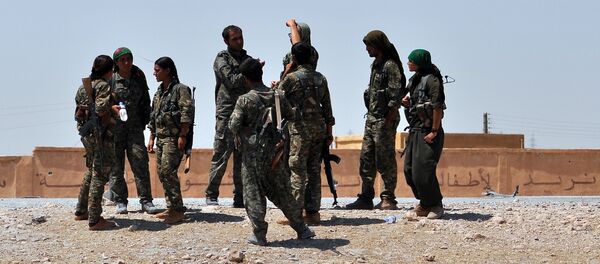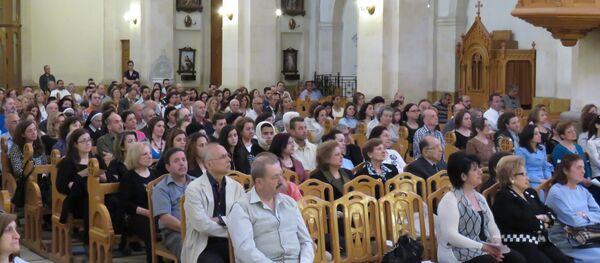Slightly over a month is left until the Syrian National Dialogue Congress in Sochi takes place on January 29-30, 2018. However, few details have been revealed so far about the upcoming event, which is undertaking an ambitious goal of pushing forward the settlement process and giving Syrians an opportunity to define the parameters of the country they want to live in.
Russian special presidential envoy for Syria Alexander Lavrentyev is shedding light on the upcoming conference in an interview with Sputnik, clarifying its goals, the attendance and the relation to the existing format of the intra-Syrian talks – the so-called Geneva process
Sputnik: How do you assess the results of the eighth Astana meeting on Syria? What has it achieved?
Lavrentyev: The last round (of Astana talks – ed.) was a success. First of all, we noted a progressive development of the situation in the de-escalation zones, a reduction in the level of violence and compliance with the ceasefire regime. Still, I have to say that fairly intensive military clashes do occur in some areas, but they are mostly of a provocative character and usually on the part of the so-called hard-line armed opposition. Even so, our commitment to stabilizing the situation in these zones is leading to positive results. We have growing trilateral cooperation between Turkey, Iran, Russia and the Syrian side. So from that point of view, there is evidence of stability and, most importantly, we see progress which is recognized by practically the whole international community whatever they may say. This is one of the achievements of the Astana process on which we will be building to move forward.
Another important aspect is of course the fact that the Astana process is acquiring more and more of a political nature and is becoming a good factor in moving the political settlement forward.
The latest meeting of Foreign Minister Lavrov and Defense Minister Shoigu with the UN Special Envoy for Syria Staffan de Mistura convinced him that Astana is not some kind of a parallel track to the Geneva process, and even less that it is in some kind of confrontation or is pursuing a hidden agenda. I think he understood it. Our conversation with de Mistura as part of Astana-8 has shown that he is aware of this and that he will try to get this message across to the UN Secretary General Antonio Guterres.
READ MORE: Talks on Syria in Astana May Build Bridge from Geneva to Sochi Congress
We very much hope that eventually the UN will support the National Dialogue Congress in Sochi.
As for the Congress. We discussed at length the conduct of this dialogue with our partners in guarantor states. We agreed and confirmed our firm intention to contribute to the holding of this major forum.
It should indeed become a milestone in promoting political settlement. The date has already been set, it is 29th and 30th (of January 2018 – ed.), everybody here has essentially agreed, everybody understands that there can be no more delay, that we cannot put all this off again and again, especially since it should contribute to the Geneva negotiations.
Staffan de Mistura said he was going to hold another meeting in Geneva in January, about January 21. It would precede the National Dialogue Congress in Sochi, and hopefully it will move forward progressively. As to where this would take place afterwards, in which capitals, that is probably up to the UN to decide. We shall see from the results of the Congress what the will of the Syrian people is.
We have also managed to break the deadlock in strengthening confidence-building measures. So far, it is a purely a formal thing, we have adopted two documents: one concerning the creation of a working group to exchange detainees, hand over the bodies and those missing in action, and the second document has to do with the memorandum on the demining of historical heritage monuments, including UNESCO sites. That is very important considering the size of the areas that still remain mined. We hear reports every day of tens of people being blown up not only where the historic monuments are located, but simply in ordinary communities.
We, the three guarantor countries, have to appoint our representatives who together with a UN representative will organize the work to agree on the lists of persons detained and held under guard, for the purpose of exchange. This is a very complicated job, but it is very useful, because it has a considerable humanitarian dimension.
Sputnik: Speaking about the National Dialogue Congress, have you managed to find a formula to ensure that Staffan de Mistura takes part in the Congress? What will be his role – moderator, chairman? What do you suggest? In his recent address to the Security Council de Mistura said that the constitutional commission should be created either in Geneva or, if it takes place outside the framework of Geneva, then there should be specific approval from the UN. In this regard, does Russia intend to seek the adoption of a new Security Council resolution to give a mandate to the Sochi Congress?
Lavrentyev: We hope of course that the Special Representative (UN Envoy for Syria Staffan de Mistura – ed.) will personally come to Sochi and will take part. We are counting on it and we have told him so. Of course the decision is to be taken by the UN, but we believe that this Congress should be held under the UN auspices and of course this structure should be represented there in the broadest way possible and not only by the members of that organization, i.e. Russia, Turkey, Iran, Syria and others. We want the UN to play a more positive role.
Of course we proceed from the assumption that the Syrians will themselves conduct negotiations and solve all the issues concerning internal Syrian settlement. There should be no pressure on the part of the UN of course. The UN may to a certain extent play a correcting, prompting and steering role, and this should also be the role of the countries taking part in the Congress. We provide the venue. For us the most important thing is for the intra-Syrian dialogue to be inclusive, that is, that all the social strata be represented, and then let them come to an agreement themselves. If something does not work out we will try to give advice, but without by any means exerting excessive pressure on anyone of those who will be represented there.
The destiny of the Syrian people is in their hands and it is up to them to decide where to go from here. As for conducting the constitutional reform, it is up to the Syrians to decide whether to create a constitutional committee, a committee to discuss (the Constitutional reform – ed.) … In any case it should be correlated with the current Syrian legislation and should be based strictly on the present Constitution.
Under the current Constitution, such a commission should be confirmed by the incumbent president. Perhaps some other legal mechanisms may be found, or perhaps the existing mechanism will be used and the commission will be set up and approved by a decree of the incumbent president and will start work on drafting a new constitution or introducing amendments to the current constitution. This decision is up to the Syrians.
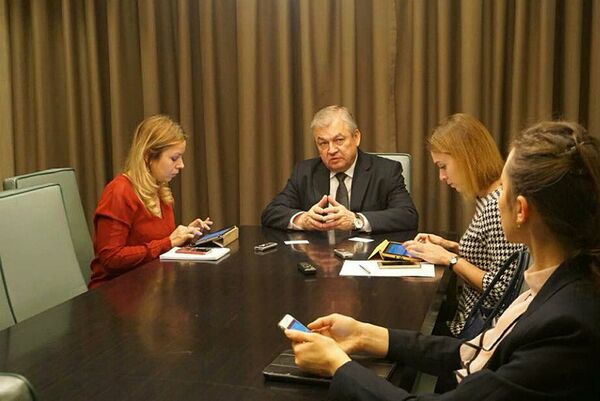
In our opinion, no special UN resolution on holding a constitutional reform will be required. We act strictly in compliance with Resolution 2254 which says that the Geneva process is a process of intra-Syrian settlement. In any case, the new Constitution will be approved not only on Syrian territory – mainly on Syrian territory, but it should also involve practically all the representatives of the Syrian people, including those who live abroad, and there are several million of them at present.
Needless to say, if additional efforts are needed on the part of the international community, we would be very glad, but the most important thing is that these should be efforts in the right direction. The boat of the Syrian settlement should be just one, and everyone should be in it and should row in the same direction. If we row in different directions then we will be spinning in one place, moreover, we will be drifting with the current and will never be able to move upstream. The international community is not doing enough at present. Some members of the international community are trying to pull the blanket toward themselves, which certainly is not the right thing to do.
READ MORE: Astana-8 Brings Russia-Iran-Turkey Agreement on Detainees, Demining, Sochi Talks
Sputnik: So, you believe that no resolution will be needed for the holding of the Sochi Congress and for sealing its results?
Lavrentyev: No, there is absolutely no need for it. That is superfluous.
Sputnik: You have indicated that after Sochi the process may move to other capitals. Could you elaborate?
Lavrentyev: Sochi should lay the foundation for the work on a new constitution. Most probably, a body will be set up which will begin this work and will bring in various experts from various opposition groups and the central government. In what format will it continue and where will the commission sit? Perhaps it will decide to sit in Damascus, given certain guarantees on the part of Russia or of some other country. That is a matter for the future, these are technical issues, but no separate resolutions will be required.
Sputnik: Was there a discussion of the concrete venues where the process launched in Sochi could move to in future?
Lavrentyev: No. Of course it can be Geneva or any other venue that will be determined.
Sputnik: You mentioned the importance of an inclusive dialogue, particularly in Sochi. In this regard, the key issue is the composition of participants in Sochi, it will be important among other things for legitimizing the Congress decisions. Are there any ideas concerning the composition and is there a consensus on the issue among the guarantor states, the Syrian government and the opposition?
Lavrentyev: Inclusivity is a very broad concept, it means that practically all the representatives should be present. How should this issue be looked at? Having only the representatives of the opposition and the central government would not be quite right, so we decided to call a National Dialogue Congress in Sochi. There are a lot of nationalities, small peoples, ethnic groups, there are very many Arab tribes and not only that.
Take the Kurds — they have considerable divisions among themselves and more than fifty organizations. It is impossible to invite everyone considering the number of provinces and the main nationalities in Syria. We have proposed to invite a certain number of representatives of, for example, Sunnites, Alawites, Christians, Kurds, the Arab tribes whose sheikhs command authority and whose opinion can make a difference, who will express their opinion on in which direction the country should move.
Sputnik: Are the Kurds from the Democratic Union on the list of the proposed attendees?
Lavrentyev: You know that Turkey is categorically refusing participation of the Democratic Union Party (PYD) in the National Dialogue Congress, because they consider the Democratic Union Party to be part of the Kurdistan Workers' Party (PKK), which they view as a terrorist organization and which they have always been fighting against, not only on their territory but also on the territories of the adjacent states. For them this is the red line. We take into account their concerns and at this stage we try to have the Kurds represented at the Congress by most respected people, those who are well-known and enjoy public support and take a neutral stance in terms of their political affiliation. There are such people, they are quite numerous, and we are in the process of reaching an agreement on these individuals.
READ MORE: Turkey Expects US to Stop Arming Syrian Kurds After Daesh's Defeat
Sputnik: Aren’t you afraid that the absence of PYD will make the Congress decisions incomplete and not inclusive enough? If not at once, could they join the process further down the road?
Lavrentyev: So far, it is hard to talk about the representatives of the Democratic Union Party (PYD) joining. I think the leadership of PYD understands that there is no point in insisting that the party take part. The most important thing for them should be to see their interests taken into account through the presence of other representatives of the Kurdish diaspora. So I think it is less of a problem than some tend to believe.
Sputnik: What will the Congress look like, how will it be organized? Will it be through subcommittees or working groups? Who will be the chairman? What will be the outcome?
Lavrentyev: It is too early to speak about that. Work is underway. Various representatives will be given the floor. Not everyone will have a chance to speak because nobody wants to turn it into a talking shop, substantive matters should be discussed. The floor will be given to various organizations: internal opposition, external opposition and armed opposition. Naturally, representatives of the central government will be given the floor. The most important thing is for the Syrian people to express their opinion not on the current authorities but on how they see the way forward for their country, how they see the organization of genuinely impartial, honest and transparent elections on their territory, what they think of the participation as observers of the forces that will help conduct these elections, various forces, including regional powers. There are many questions.
Of course, some subcommittees will be created. I hope they will include a subcommittee for constitutional reform, for humanitarian issues and for issues related to the reconstruction of Syria. I am very confident that the Congress will appeal to the international community to contribute to reconstruction. The time has probably come to also consider the lifting of the Western sanctions. There is a lot of talk about restoration programs, but it is just talk and, as we all see, the country needs help, and not only financial help.
Sputnik: Is anyone being considered for the role of the Congress Chairman? There have been rumors that Farouk Sharaa [Syria’s former Vice President] could be the one.
Lavrentyev: These are just rumors. No names have been put forward.
Sputnik: How will all this be organized technically? Will the Olympic facilities in Sochi be used to conduct the Congress?
Lavrentyev: Obviously, the experience of hosting the Olympic Games in Sochi will be used to organize such a major event. After all, 1500 people will be present. Perhaps one or other Olympic facility will be used.
Sputnik: I hear that MGIMO [Moscow State Institute of International Relations] is recruiting volunteers for the Congress.
Lavrentyev: Yes, work is underway. There will be many participants, and they will have to be accommodated at the hotels, and that also involves the issues of security and the need to prevent possible friction, to put it mildly, among participants during their free time. There are many issues to be solved, and of course we will need many volunteers who are going to be involved, and interpreters.
Sputnik: Isn't two days a rather short time for such a large-scale event?
Lavrentyev: If the event drags on, then there will be a danger that it will develop into a chaotic event, it will be hard to achieve real concrete goals. A clear task and goal should be set, and we should move toward it. Afterwards, it will be a process. We expect that it will not be a one-time event. If it is put under the UN aegis afterwards, under Geneva, this is absolutely normal and welcome. This will be our contribution to the process of the political settlement.
Sputnik: Will guarantor states take part in the Sochi meeting at some level?
Lavrentyev: That issue is still being agreed upon. We think that perhaps guarantor states, UN representatives and possibly other members of the international community, who deserve to be represented there, would be present as observers. But there again I would like to say that they would be there exclusively in the capacity of observers, they should be present, and by their presence support the aspiration of the Syrian people to find a way out of the stalemate, but on no account should they exert any pressure. I don't think any of the countries will be given the floor. This is our plan as it stands today.
Sputnik: What do you see as the maximum result that you can achieve if everything goes well? When can practical implementation of the results be discussed? Here I mean, obviously, the constitutional reform and some kind of a transitional government?
Lavrentyev: It is too early to talk about that. The main thing is to launch the process, the main thing is to get it going.
Sputnik: So, you are not setting any deadlines, right?
Lavrentyev: We are not. Perhaps six months, perhaps a year. The most important thing is to launch the process so that the idea is not rejected by the international community, by the UN, but on the contrary, is taken up and is translated into concrete deeds. The timeframe is not so important. Having said that, of course everyone wants real results to be achieved as soon as possible.
Sputnik: I would like to draw attention to the working group on prisoners. So far, no details have been revealed. When will it start its work?
Lavrentyev: The working group will include representatives of the guarantor states, several persons from each, and of the UN. Previously, we were thinking of including representatives of the Syrian central government and the opposition, but at this point we do not think this is required. It should start its work within the next two or three weeks, it will hold consultations with the representatives of the armed opposition and the central government, process the materials that come to hand concerning the detained persons and then agree on the issues of exchange. It will also involve – there are such plans and they are recorded in the document – about the representatives of the International Red Cross and the Syrian Red Crescent, and, if necessary, other international organizations and non-governmental organizations.
Sputnik: So far, then, it is established only at the level of experts from guarantor countries, right?
Lavrentyev: Yes. The group will periodically report back to the guarantor states on the work that has been done, on the obstacles that arise, and on what can make the work more effective. We feel that one has to start somewhere. This is a very sensitive issue. The Syrian government and the opposition accused each other of non-compliance with certain conditions. Both express fear about the fate of the detainees, and therefore refuse to hand over the lists to each other. We will try to break this vicious circle by creating a working group of guarantor states. We have managed to do it during the course of Astana-8 meeting, although it took a big effort.
Sputnik: How possible is it in your opinion to restore the confederation in Syria?
Lavrentyev: The question of the federal structure is very complicated. The Syrians should solve it themselves, I would rather refrain from giving any assessments as to whether or not it is the correct step: it is something to be decided by the Syrian people. The main thing is to create normal conditions so that all the Syrians may express their points of view. If they speak in favor of a federation, then that would be the thing to do. If they say no, if they say that this would lead to divisions and a split of the country into fiefdoms and further secessions – that would be wrong. There are such fears, they are not totally groundless considering the aggravation of intercommunal relations over the past seven years. And yet seven years ago it was a model Middle East country where representatives of all religions coexisted peacefully.
Sputnik: After the war all the Christians fled, although earlier there was a balance [between Christian and non-Christian population]. The church needs support now. What is your take on it?
Sputnik: Is the holding of the Congress under threat from any forces or countries? Are you aware that someone does not want the Congress to be held or to succeed? Do you expect any attempts to destabilize the situation in Syria after the start of the Russian troops’ withdrawal from Syria?
Lavrentyev: Of course we are aware of such attempts. Not everyone is happy to see Russia leading the process of the Syrian political settlement, and not only political settlement, but also the fight against the Islamic State (ISIS, Daesh, banned in Russia as a terrorist organization – ed.), and against terrorist groups in Syria. Not everybody likes that. Let us not put our finger on these countries. The speeches of these countries' representatives that were delivered officially at various venues, regarding the Astana process and the forthcoming National Dialogue Congress, speak for themselves.
Again, Russia in this case is simply trying to do what any other country is required to do: we should set aside our own interests and act in the interests of the Syrian people. We are trying to do that. Will anyone manage to prevent it? I don't think so, because we are moving in the right direction, and if the Syrian people decide to support us, that will be evident during the course of the National Dialogue Congress.
READ MORE: Saudi Lawmaker Expects Moscow-Riyadh Rapprochement on Syria
More and more countries that previously took a hard line with regard to the current authorities in Damascus are revising their position. For example, Saudi Arabia. When I attended, on the president's instructions, the Conference in Riyadh, the so called Riyadh-2, they were absolutely emphatic in trying to make the opposition change its mind and to persuade them to remove the insulting passages with regard to the incumbent authorities from the final communique.
Sputnik: So, the Saudi authorities objected to the reservation that Assad must go?
Lavrentyev: Yes, exactly, Foreign Minister Adel al-Jubeir and many others tried to persuade them not to put it in the final communique in order to ensure normal conditions for Geneva (the 8th round of inta-Syrian negotiations in Geneva – ed.), but they failed. We warned that it could have dire consequences, and they admitted it themselves, they said: we understand, but we cannot do anything about it, these are very difficult people; they said that they had allegedly tried to cleanse the opposition’s ranks of radicals, but others came along. Nature abhors a vacuum. Some hard work lies ahead. Although we have defeated ISIS (Daesh, terrorist group that is banned in Russia – ed.), there is still very hard work ahead, especially on the political track. Nobody knows how much time it will take.
Sputnik: Do you expect that the opposition represented in Geneva will take part in the Congress? And how does that square with their demand that Assad must go?
Lavrentyev: If you saw the joint statement of Iran, Russia and Turkey (on the results of Astana-8 – ed.), it says that we at the National Dialogue Congress expect to see all the representatives of the Syrian opposition provided they want to protect the territorial integrity and unity of Syria, its sovereignty and independence, and want to struggle against the Islamic State (Daesh, terrorist group banned in Russia – ed.), and want the secular character if the state, though this provision can been questioned, but still. If these people take a constructive position, then of course we are ready to host them and to allow them to come. But if they want to use the Sochi venue in order to make another call for getting rid of Bashar Assad, I think they had better not come, because clearly these people advocate continued military action. We want to see the presence of those who come out only for political dialogue. So that they sit down calmly, set aside all their prejudices, get together and discuss how to move forward.
Sputnik: Would you like to see the US in the capacity of observers at the Congress?
Lavrentyev: So far, the US has not expressed a particular desire to be present, but we will think about it. If they offer to be present as observers, we will probably give them this opportunity. But again, this needs to be agreed and thought over.
Sputnik: Are you aware of any kind of resistance to the Congress from the American side?
Lavrentyev: We expect from them a constructive approach to this issue and support, because we are all working for a common cause, we are trying to bring back peace to Syria. It does not matter how and whose idea it is. The main thing is the result at the end of the road. How? If possible, [it should be done] by conducting the [National Dialogue] Congress. Let us move forward together in the same direction.
The interview was taken by Anastasia Levchenko, Elena Glushakova and Katya Toame Bitan.

